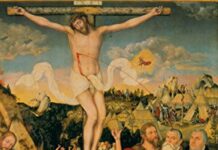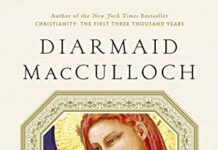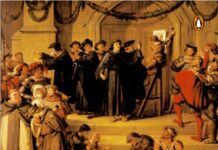
Ebook Info
- Published: 2010
- Number of pages: 1209 pages
- Format: PDF
- File Size: 6.72 MB
- Authors: Diarmaid MacCulloch
Description
The New York Times bestseller and definitive history of Christianity for our time—from the award-winning author of The Reformation and SilenceA product of electrifying scholarship conveyed with commanding skill, Diarmaid MacCulloch’s Christianity goes back to the origins of the Hebrew Bible and encompasses the globe. It captures the major turning points in Catholic, Protestant, and Orthodox history and fills in often neglected accounts of conversion and confrontation in Africa, Latin America, and Asia. MacCulloch introduces us to monks and crusaders, heretics and reformers, popes and abolitionists, and discover Christianity’s essential role in shaping human history and the intimate lives of men and women. And he uncovers the roots of the faith that galvanized America, charting the surprising beliefs of the founding fathers, the rise of the Evangelical movement and of Pentecostalism, and the recent crises within the Catholic Church. Bursting with original insights and a great pleasure to read, this monumental religious history will not soon be surpassed.
User’s Reviews
Reviews from Amazon users which were colected at the time this book was published on the website:
⭐MacCulloch’s very detailed Christianity starts a thousand years before Christ with the Greek and Jewish foundations that formed the world’s biggest religion. MacCulloch describes himself as a “a candid friend of Christianity” (p. 10), and perhaps some will find his viewpoint more objective than that of a devoted believer. I am less enthusiastic. But I am glad I read the book.To the extent that I am qualified to comment, I find his views in line with mainstream Christian scholarship. Since I have difficulty with what I will uncharitably call the biblical revisionism that forms the foundation for much of the modern understanding of ancient Judaism, Christianity, and the Bible, at least in mainstream liberal critical circles, I found his exposition of Jewish and Christian history, through the second century, disappointing but unsurprising. I look forward to the day when scholars come to terms with the fact that, if they reject the more speculative aspects of nineteenth and early twentieth century biblical revisionism, they must also reject the more recent extrapolations of the earlier conclusions. My viewpoints are much more inline with those of Bruce, Carson, Kitchen, Longman, and Robinson.*After introducing himself, MacCulloch starts his book with a discussion of ancient Greek history and philosophy, and its influence on Christian belief and theology. I found this very helpful. MacCulloch explained how Greek culture influenced Jewish culture throughout the Roman empire. He discussed how Greek notions of the perfection of God clashed with the more personal, passionate, and earthy Jewish God of the Bible. He pointed out how that for Greeks, the God of the Old Testament was the almost the antithesis of their ideas of God. Included in the discussion was Diogenes, Socrates, Plato, Aristotle, and Pythagoras. MacCulloch later shows how these philosophers influenced both mainstream and heretical Christian belief throughout Christian history.MacCulloch is really quite ambitious to try to teach all of Christian history, in all the world, from before Christ to now. This is not just a broad brush summary of Christian history: there is depth and detail, in my opinion, too much detail. In any given century, there seem to be about a half a dozen major heresies, at least two or three mainstream accepted theologies, a number of important Christian leaders, several major wars, one or more genocides, a new expectation of the end of the world, a few major missionary efforts, one or several large political shifts, a new understanding of what it means to be Christian, and the relentless expansion of the Christian church. There is a lot of information here, and I would like to assimilate it better, but for me, I am overwhelmed.I like MacCulloch’s story telling style. It is enjoyable and informative and very readable. But I had trouble absorbing key points. As MacCulloch points out, many Christian leaders and theologies continue to impact the faith for centuries after their inception. When a student first encounters these leaders and theologies, it is not obvious which ones will become important. As I am reading about them, I don’t know what to focus on. Without knowing history, I don’t know how to read history! A little help from the teacher in this instance would be appreciated.As an example, MacCulloch describes Martin Luther’s theology in the context of his life, including his upbringing, rivalries, influences, politics, and travel. We then learn the stories of Luther’s followers. Eventually great changes are triggered by Luther’s writing, several large protestant denominations develop, even the course of nations is changed, and each development has a history of its own. MacCulloch expounds seemingly on each development of theology, ritual, art, politics, and culture, decade by decade, throughout Europe, and then beyond. In the midst of all this information, I become lost. What was it that Luther was trying to say? The problem with history is there is just too much of it!In spite of my complaints, I am glad I read the book. It has made me aware of the size and diversity of Christianity. I have learned a little about tolerance, and especially intolerance. I have learned about the quest for power, influence, and control in human institutions, churches, and nations, and especially the horror that can result. And I have learned a little about belief, faith, hope, and spirit; I think I have especially learned that humility is key to love and understanding, for each other and our creator. Overall, I liked the book, not a lot, but I liked it. I may read it again, and if I do, I will take better notes. I hesitantly recommend it.——————–* That is I more closely embrace the viewpoints expressed in the following books:- Bruce, F. F. The New Testament documents : are they reliable. Grand Rapids, Mich. Downers Grove, Ill: Eerdmans InterVarsity Press, 2003.- Carson, D. A., and Douglas J. Moo. An introduction to the New Testament. Grand Rapids, Mich: Zondervan, 2009.- Kitchen, K. A. On the reliability of the Old Testament. Grand Rapids, Mich: W.B. Eerdmans, 2006.- Longman, Tremper, and Raymond B. Dillard. An introduction to the Old Testament. Grand Rapids, Mich: Zondervan, 2006.- Robinson, John A. Redating the New Testament. London: S.C.M. Press, 1976.Note: Rated three out of five stars on Goodreads, as Goodreads defines three stars as “I like it” and two stars as “It’s okay”.
⭐I write this review from the perspective of a person who believes in a personal God, the deity of Christ, and his death and resurrection as a propitiation for sin — substitutionally atonement. I dislike labels, but the term “Evangelical” is likely the one with the best fit. This book needs to be read through a particular lens. Dr. Mccullough, although an ardent believer in his youth, is quite cagy about his present beliefs and after watching a number of his lectures I doubt he is even a deist. That doesn’t make his scholarship bad. He characterizes himself as a “friend of Christianity” and I will take that at face value.He does a great job in synthesizing vast amounts of history of the Christian faith and making it, although not easy for the sluggardly of mind, extraordinarily approachable for anyone willing to bugger on with the effort. I contrast his work with that of Schaff which, although more sympathetic to my point of view, is so detailed as to be almost unapproachable. I highly recommend the book to anyone wanting to better understand the history of the faith, which I regard as extraordinarily important.Back to the lens. Dr. Maccullouch’ scholarship as a historian is more compelling than his scholarship as a theologian. Where he sees accidents of history, I see (through my lens) God’s provincial hand. Where he sees, with historical merit, much messiness in the growth of the faith and acts of much evil, I see (through my lens) a distinction between the essential messages of Christianity and how man, in his fallen nature, and often betrayed those central messages, much to his (generic) shame.This book is a masterpiece of history, if not of theology. I am very glad I took the (considerable!) time to read it.
⭐While this book could be used as an entry level text in college or seminary (I’ve taught both), it’s really aimed at a general audience. While the author presumes little (other than an acceptance that the evidences of history, archeology and logic should have meaning for readers of the Bible and theology), and does not make assumptions concerning the faith of its readers, it does come from a perspective faith seeking understanding, and the embedded presumption that Christianity can and should have meaning in people’s lives. With this said, I found it to be a well informed theological and historical exploration of the first 3000 years of Christianity. The opening chapters, being a whirlwind of Biblical criticism and Greek and Latin history move along very briskly. Sometimes bits of detail are missing, but not often.
⭐I was hoping to find a reliable history of the Christian church and especially the Hellenistic influence on church doctrine. The fact that it started exactly where it should, in both Ancient Greece and Israel was a plus. That it got such accolades from elitists was a concern, but I am always eager to read people with different perspectives as I always learn from them even if I disagree with their particular “theology.” No one, especially historians, are unbiased. But MacCulloch’s superficial understanding and misrepresentation of events that any adolescent could read and easily understand for themselves, such as the story of King Saul and David, makes me skeptical that his judgment about the Gospels and the rest of the church’s history is anything one can rely on. Such a gargantuan undertaking requires a level of humility that MacCulloch does not know exists. I have not finished reading it, and will give an update when I do, but for someone looking for a serious, unbiased history that shows an understanding of both the larger story and the specifics, should look elsewhere. His style is engaging if not arrogant at times, but I care much more about thoughtful insights. Hopefully I will encounter a morsel or two of wisdom to make the rest of the read worthwhile. If I do I will humbly acknowledge it.
⭐The lack of knowledge in regards to the section of the book covering Islam is truly stunning. For a scholar to lack such basic knowledge and to act an as Islamic apologist for the rise of the Islamic caliphate and the death of 200 million people and to merely brush it off as excess is truly remarkable.Muhammad is called “The Prophet” which for a scholar to do who is claiming to be a neutral historian is remarkable as nowhere else in the book for example is Jesus The Christ called The Messiah.And then to make the astonishing claim that Muslim conquerors did little to explain their faith to their new subjects or to convert them to it.For almost 1400 years Islam has forcibly converted non Muslims to Islam especially children.Anybody seeking further proof of this should study closely the brutal Islamic conquest of India.These are just afew examples of the Isamic apologist attitude of the author so please read with caution.
⭐This is a work of remarkable scholarship and erudition, staggeringly comprehensive & packed with more characters, ideas, isms and schisms than anyone could possibly remember. What it doesn’t do is discuss the emotional and spiritual benefits which religious people presumably get from their faith. It is very much a bureaucratic history of the organisational and power structures of Christianity over the millennia, and that focus brings a number of issues to the fore: (i) The extent to which a religion’s spread is dependent on the support of militarily and economically successful temporal power (ii) The sheer scale of the time and manpower devoted to attempting to impose uniformity of thought on a range of issues which by their very nature are unknowable (iii) The extent to which core Christian beliefs and practices were developed long after Christ’s lifetime in response to changing geographical and historical circumstances (iv) The remarkable triviality of many of the issues over which Christians have been ready to hate, fight and kill one another (Is Christ one personality in two forms or two personalities, one human and one divine? Does the Holy Spirit “proceed” from God and Christ or from God alone? Is there a Trinity and if so what is the pecking order within it? Is Mary the mother of the world? Should the host be elevated?…) (v) The strangeness of many of the concepts at the heart of the Christian message – “sin”, “grace”, “salvation” and particularly the weird obsession, which seems to be one of the constant themes of the history as MacCulloch tells it, with the “end days” and the apocalyspe/rapture which so many people appear to have been imminently anticipating and hoping for since the time of Jesus. Watching the history unfold over more than 1,000 pages, the reader wonders whether to admire Christianity as a structure for preserving scholarship and knowledge and civility through centuries of turmoil and strife, or to look on horrified at the waste of so much time and effort and resource on arguing over unanswerable questions. The way MacCulloch tells it, it almost seems that mankind was offered a choice 2,000 years ago between the approaches of Aristotle, based on learning from observation of the reality of the material world, and Jesus, based on assumptions about the nature of an unobservable and notional immaterial world, and went off down a gigantic centuries-long blind alley. Not that MacCulloch is banging the atheist drum – he doesn’t take sides, and it’s difficult to tell from this book what his beliefs might be, but there is a definite sense of indulgence towards those motivated by faith, whether they are baptising slaves as they are taken off the ships or deciding not to burn so many witches or finding “good scriptural reasons” for suppressing Galileo’s knowledge, compared to a rather snide tone towards the personal failings of the Enlightenment philosophers. However, there is an awful lot in this book to bolster any atheist in his or her beliefs. It becomes very amusing, as the history moves into the period of growing secularisation, human rights and scientific understanding, quite how often MacCulloch notes that developments offered “an opportunity for humility” for churches.
⭐This is a monumental, and undoubtedly very well-written and absorbing, work. I was apprehensive about reading it at first given that it was written by someone who although the son of a Christian priest is not actually a believer; perhaps only one who is can truly understand the faith and so present it fairly. Nonetheless, it’s useful to have an analysis from a person who isn’t entirely an insider. The important thing for both believers and nonbelievers to understand is that it’s fair-minded. It’s a warts-and-all study which quite rightly does not seek to gloss over the fact that Christians have not always lived up to their professed principles, their message of love and peace for all. It also however makes clear that the faith has included many people of genuine compassion and humanity, as well as been responsible for so much in the way of art, literature and music, along with the atrocities (these days, where the latter is concerned, it’s generally the Christians who are the victims). Because it covers such a huge scope of space and time there’s inevitably a lot that it misses out; in particular it doesn’t quite capture the anguish of many Christians in Western Europe at declining church membership and the sense of being under attack by militant atheists whose attitude can be very nasty, or the fact that despite the way in which it’s vilified by some it’s actually evolved over the past century from a monolithic and arguably oppressive institution to something like an agency for benign social work! My main gripe is that although the author criticises those who “sneer at political correctness” his insistence on referring to people and places in the original vernacular (it would seem we are expected to say “Inka” not “Inca” and “Fernando and Isabel” rather than “Ferdinand and Isabella” when referring to the twin rulers of late fifteenth-century Spain) goes beyond what is necessary and is genuinely irritating (the word I would use is pedantic). But this shouldn’t be allowed to detract from the book’s overall value.
⭐If you wish to read a detailed account on the history of Christianity then this book is ideal.The author has structured this book in such a fantastic way that it makes a really absorbing read. As a student of the Christian theology, I was extremely impressed by the layout of all the material contained inside this book and I found it very simple to follow.The attention to detail was clearly evident as each historical period was covered; presented accurately in such a wonderful easy-to-read format.
⭐I think if you write 1000 pages on anything, it’s going to do the job, therefore, being 1016 pages long, this book is an amazing and staggering odyssey of the history of who we are, particularly for us Western Asians, Europeans and westerners etc, however, a lot of the book also deals with Eastern Christianity, mainly centred around Asia Minor and Constantinople (the Eastern Roman Empire). The book is about the spread of Christianity from humble beginnings to world domination, to that end absolutely every country and continent that has been touched by Christianity is mentioned in this book. From small beginnings in ancient Israel to Asia Minor (Turkey), Greece, Rome, Egypt, Ethiopia, Spain, the British Isles, Germany, Poland-Lithuania (a country of religious tolerance and pluralism) Russia (from Greek Orthodox I think), China, India, Japan, Korea, America, Mexico, Latin America, Australia etc (the list goes on and on), practically the whole of planet Earth is covered. The eastern and western churches are a major theme throughout the book, namely Orthodox and Catholic Christianity and how they became separated, also obviously the Reformation and Protestantism are major themes. All the myriad different schisms of the eastern and western churches, such as miaphysite and dyophysite, which basically mean the belief in either the oneness or dual (human and divine) aspects of Jesus Christ respectively. Also the chalcedonian and non-chalcedonian confessions are a major theme. Also obviously, the myriad of sub-confessions of Protestantism and the Reformation are also a major theme throughout much of the book, too many to recount here. It’s crazy because most of the chapters of this book, excepting the last two are a successful and all together pleasing, forward, happy and ‘good news’ kind of a story of Christianity. The only negative or slightly depressing bits in all but the last two chapters are the Islamic surges in and conquests of Christendom, mostly depressingly of all Byzantium (the eastern Roman Empire), parts of south Eastern Europe and Spain. The Muslims even reached into France and were defeated at Battle of Tours, also called Battle of Poitiers in October 732 AD. So that is the only depressing bit in 90% of the book. Then come the last two chapters which deal with the twentieth and twenty first centuries, and GHEEZE what a sad and weird story the ‘history of Christianity’ is! I don’t mean this book, the book is absolutely amazing, but the actual and inescapable ‘history of Christianity’ is a sad and lunatic story. Obviously, after the world wars, the Holocaust and the scourges of both Nazism and Communism, Christianity (or is it just Europe?) completely just bottoms out. After the Holocaust, the westerners (mostly Protestants) can’t control a thing, I mean such as the 1960s cultural revolution and its sexual liberations etc. They can’t even control, contraceptives, abortions, same-sex marriages and women ordinations etc. The last two chapters send shivers down your spine and make you gulp! Out of the doom and gloom of the twentieth century you cannot help but think ‘GHEEZE this is not going to end good!’ Definitely nobody, post-Holocaust is listening to the Pope or the Catholic Church regarding such matters. It’s such a sad and depressing story. However, thankfully, Diarmaid MacCulloch kindly picks up and ends with a warm, friendly and positive note in the last few pages. This book is by far the largest and longest book that I have ever read, save the Bible, however, it is different to the Bible in that it’s so fascinating that I couldn’t read it fast, (I averaged 14.3 pages a day), and it has you hanging on every word, especially (and ironically) the last two demoralising chapters. If you take on this massive and amazing book, stick with it, it is an odyssey, it is an achievement and you will get rewarded.
Keywords
Free Download Christianity: The First Three Thousand Years 1st Edition in PDF format
Christianity: The First Three Thousand Years 1st Edition PDF Free Download
Download Christianity: The First Three Thousand Years 1st Edition 2010 PDF Free
Christianity: The First Three Thousand Years 1st Edition 2010 PDF Free Download
Download Christianity: The First Three Thousand Years 1st Edition PDF
Free Download Ebook Christianity: The First Three Thousand Years 1st Edition





